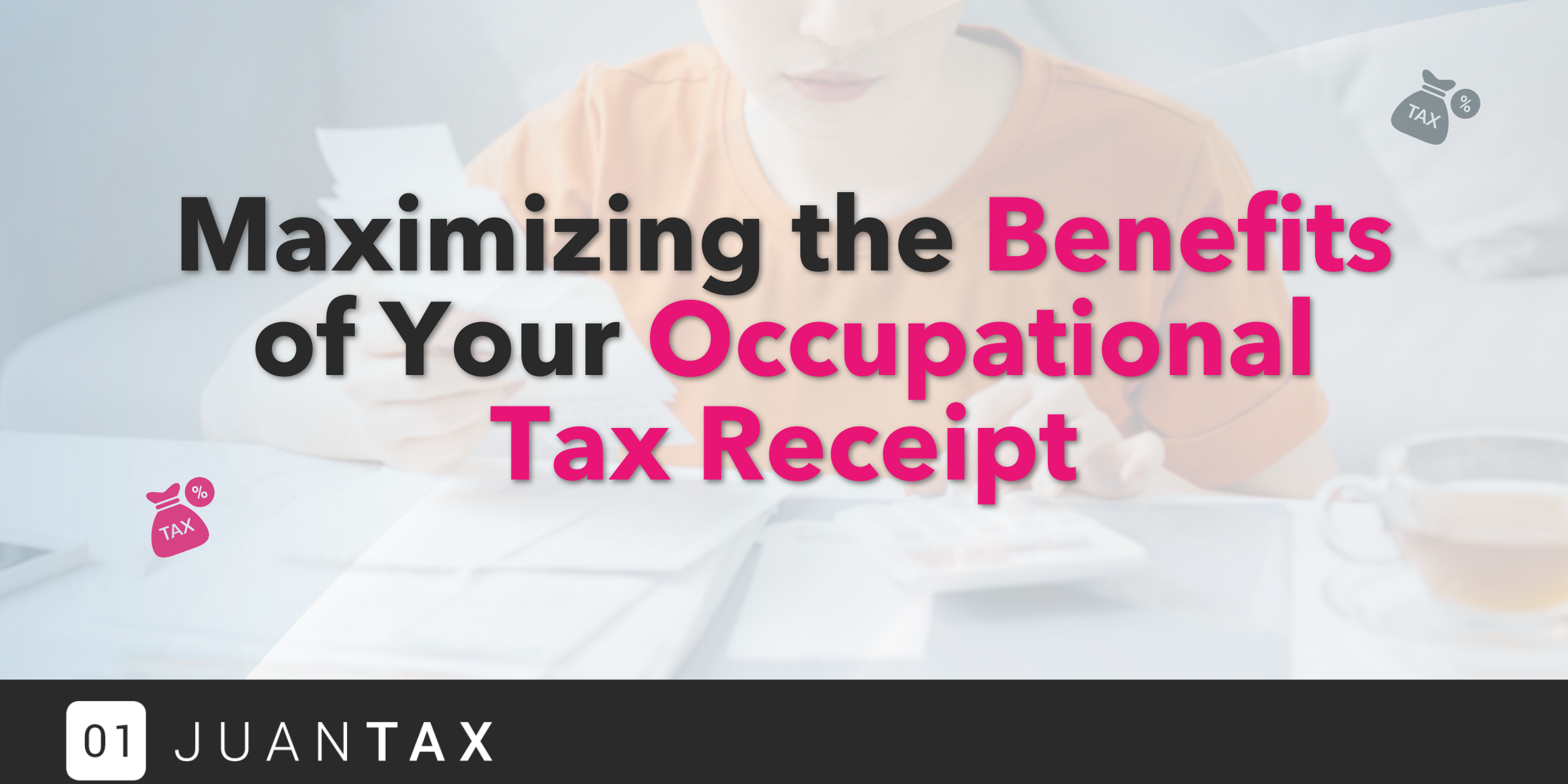Running a business can be challenging, and there are many aspects to consider when it comes to compliance and regulations. One of the most critical aspects is obtaining an occupational tax receipt, which can offer businesses many benefits, including legitimacy and access to resources. However, simply obtaining the necessary documentation is not enough.
It is also essential to understand how to maximize the benefits of your occupational tax receipt, and this topic is critical for businesses, licensed professionals, professionals registered as a self employed professional and currently practicing their profession looking to operate successfully and legally.
In this article, we will explore the different types of occupational tax receipts, the application process, potential penalties for non-compliance, and the common misconceptions about occupational tax receipts. By understanding and maximizing the benefits of your occupational tax receipt, you can position your business for success and make a positive impact on your local community.
Different Types of Occupational Tax Receipts
Occupational tax receipts, also known as business licenses or permits, are legal requirements for individuals and businesses to operate in a specific location and industry. There are several types of occupational tax receipts, including:
- City occupational tax receipts: These are licenses or permits issued by cities or municipalities to individuals and businesses operating within their jurisdiction. The requirements and fees for these vary depending on the location and type of business.
- Country occupational tax receipts: These are similar to city occupational tax receipts, but are issued by countries rather than cities. They are also subject to specific requirements and fees based on the location and type of business.
- Professional occupational tax receipts: These are licenses or permits required for individuals in certain professions, such as doctors, lawyers, or architects. The requirements and fees for these are typically based on the specific profession.
To sum up, there are several types of occupational tax receipts that individuals and businesses may be required to obtain depending on their location and industry. City, and Country, are issued by different levels of government and have varying requirements and fees. Professional occupational tax receipts are required for individuals in certain professions, such as doctors, lawyers and graphic artists. It is important to understand which type of occupational tax receipt is required for your business or profession to ensure compliance with local and state regulations. Additionally, It is important for business owners to be aware of any documentary stamp tax (DST) requirements associated with their occupational tax receipt, and to ensure that they comply with any applicable regulations to avoid penalties and fines.
Application Process in Obtaining an Occupational Tax Receipts
The application process for obtaining an occupational tax receipt, also known as a business license or permit, can vary depending on the location and type of business. However, there are some general steps that most applicants can expect to follow. This registration process typically involves determining the type of occupational tax receipt needed, gathering required information and documents, completing the application form, submitting the application and paying registration fee and waiting for approval. In some cases, applicants may also be required to undergo inspections or meet specific requirements based on the nature of their business.
These are some general steps involved in the application process for obtaining an occupational tax receipt. Here’s a more detailed breakdown of each step:
- Determine the type of occupational tax receipt needed: As we discussed earlier, there are different types of occupational tax receipts depending on your location and type of business. It is important to determine which type of occupational tax receipt is required for your business before starting the application process.
- Gather required information and documents: The application process typically requires applicants to provide certain information and documents, such as proof of identification, certificate of registration or incorporation documents, and information on the nature of the business. It’s important to gather all the required information and documents before starting the application process.
- Complete the application form: The application form will typically require you to provide information about your business, such as its name and address, the type of business, and the names of the owners or managers. Be sure to carefully review and complete the application form accurately and thoroughly. If you want to change any of the information, BIR Form 1905 may be required particularly for professionals who have changes in their registered address or contact information.
- Submit the application and pay the fees: Once the application is completed, you will need to submit it to the City Treasurer’s Office along with any required fees or payment form. Fees can vary depending on the location and type of business.
- Wait for approval: After submitting your application and paying the fees, you will need to wait for the occupational tax receipt to be approved. This process can take several days to several weeks, depending on the location and type of business. Once approved by the Revenue District Office (RDO and Local Government Unit (LGU)), it will issue receipts specifically occupational tax receipts will be issued and you will be able to legally operate your business.
By understanding the application process and the requirements for obtaining an occupational tax receipt, business owners can ensure that their business is compliant with local and state regulations and avoid any legal or financial issues.
Penalties for Non-Compliance with Occupational tax Receipts
Businesses that fail to comply with occupational tax receipt requirements can face a range of penalties, including fines, revocation of the occupational tax receipt, legal action, and even business closure. Let’s take a closer look at each of these potential penalties:
- Fines: Non-compliance with occupational tax receipts can result in fines that vary depending on the location and type of business. These fines can range from a few hundred dollars to thousands of dollars.
- Revocation of the occupational tax receipt: Non-compliance can result in the revocation of the occupational tax receipt, which means the business is no longer authorized to operate legally. This can result in the closure of the business.
- Legal action: Non-compliance can lead to legal action by the government, which can result in additional fines or penalties. In some cases, legal action can result in criminal charges against the business owners or managers.
- Business closure: Non-compliance with occupational tax receipts can result in the closure of the business, either by revocation of the occupational tax receipt or legal action taken against the business.
It is important for businesses to comply with local and state regulations regarding occupational tax receipts to avoid any potential penalties or legal issues. By understanding the potential penalties for non-compliance, businesses can take steps to ensure that they are operating legally and avoid any potential fines or legal action.
Benefits of Having Occupational Tax Receipts
The benefits of having occupational tax receipts, also known as business licenses or permits, can vary depending on the location and type of business. Generally, having occupational tax receipts can provide businesses with legal authorization to operate and access to certain benefits, such as government contracts and liability protection. It is important for businesses to understand the benefits of having occupational tax receipts to ensure that they are operating legally and taking advantage of available opportunities.
These are some of the benefits of having occupational tax receipts. Here’s a more detailed breakdown of each benefit:
- Legitimacy: Having an occupational tax receipt provides businesses with legal authorization to operate. This legitimacy can be important for building trust with customers, suppliers, and investors.
- Compliance: Obtaining an occupational tax receipt requires businesses to comply with local and state regulations. This can help businesses avoid potential penalties or legal issues and operate in a responsible and ethical manner.
- Access to resources: Some occupational tax receipts provide businesses with access to certain resources, such as government contracts, business loans, and grants. This can help businesses grow and expand their operations.
- Data collection: Occupational tax receipts can help local governments collect data on businesses operating in their jurisdiction. This data can be used to identify areas of economic growth and develop policies to support local businesses.
- Support for local government: Obtaining an occupational tax receipt can provide financial support for local government services, such as roads, schools, and emergency services. This can help maintain a healthy and thriving community.
By understanding the benefits of having occupational tax receipts, businesses can ensure that they are operating legally and taking advantage of available opportunities.

Common Misconceptions about Occupational Tax Receipts
There are several common misconceptions about occupational tax receipts, also known as business licenses or permits. These misconceptions can lead to confusion and misunderstandings about the requirements and benefits of having an occupational tax receipt. It is important for businesses to understand these misconceptions to ensure that they are operating legally and taking advantage of available opportunities.
Here are some of the common misconceptions about occupational tax receipts. Here’s a more detailed breakdown of each misconception:
- Occupational tax receipts are only necessary for certain types of businesses: This is not true. In most cities and states, any business that operates within a certain jurisdiction is required to obtain an occupational tax receipt.
- Occupational tax receipts are only required in certain cities or states: This is also not true. While the specific requirements for obtaining an occupational tax receipt may vary by jurisdiction, businesses are generally required to obtain one wherever they operate.
- Occupational tax receipts are only for tax purposes: While occupational tax receipts do have tax implications, they are also required for businesses to operate legally and can provide access to certain resources and benefits.
- Occupational tax receipts are easy to obtain and renew: This can vary by jurisdiction and type of business. Some occupational tax receipts may require extensive documentation and approval processes, and renewal requirements may differ from initial application requirements.
- Occupational tax receipts are unnecessary for small businesses: This is not true. Regardless of size, businesses are generally required to obtain an occupational tax receipt to operate legally.
By understanding and debunking these misconceptions, businesses can ensure that they are operating legally and taking advantage of available opportunities.

KEY TAKEAWAYS
In conclusion, obtaining an occupational tax receipt is an important step for businesses to operate legally and take advantage of available resources and benefits. It is important to understand the different types of occupational tax receipts, the application process, and the potential penalties for non-compliance, also keeping a proper book of accounts is an essential part of maximizing the benefits of your occupational tax receipt.
Additionally, common misconceptions about occupational tax receipts should be debunked to ensure that businesses are meeting their legal requirements. By taking these steps, businesses can position themselves for success and contribute to the growth and prosperity of their local communities. So, make sure to check your local government requirements and obtain the necessary occupational tax receipt for your business.
Our platform simplifies the tax filing process, saving you time and stress. With JuanTax, you can ensure compliance with government regulations and focus on what really matters – growing your business.
Try it out now and experience the benefits for yourself! Visit our website at https://juan.tax/ to learn more!













